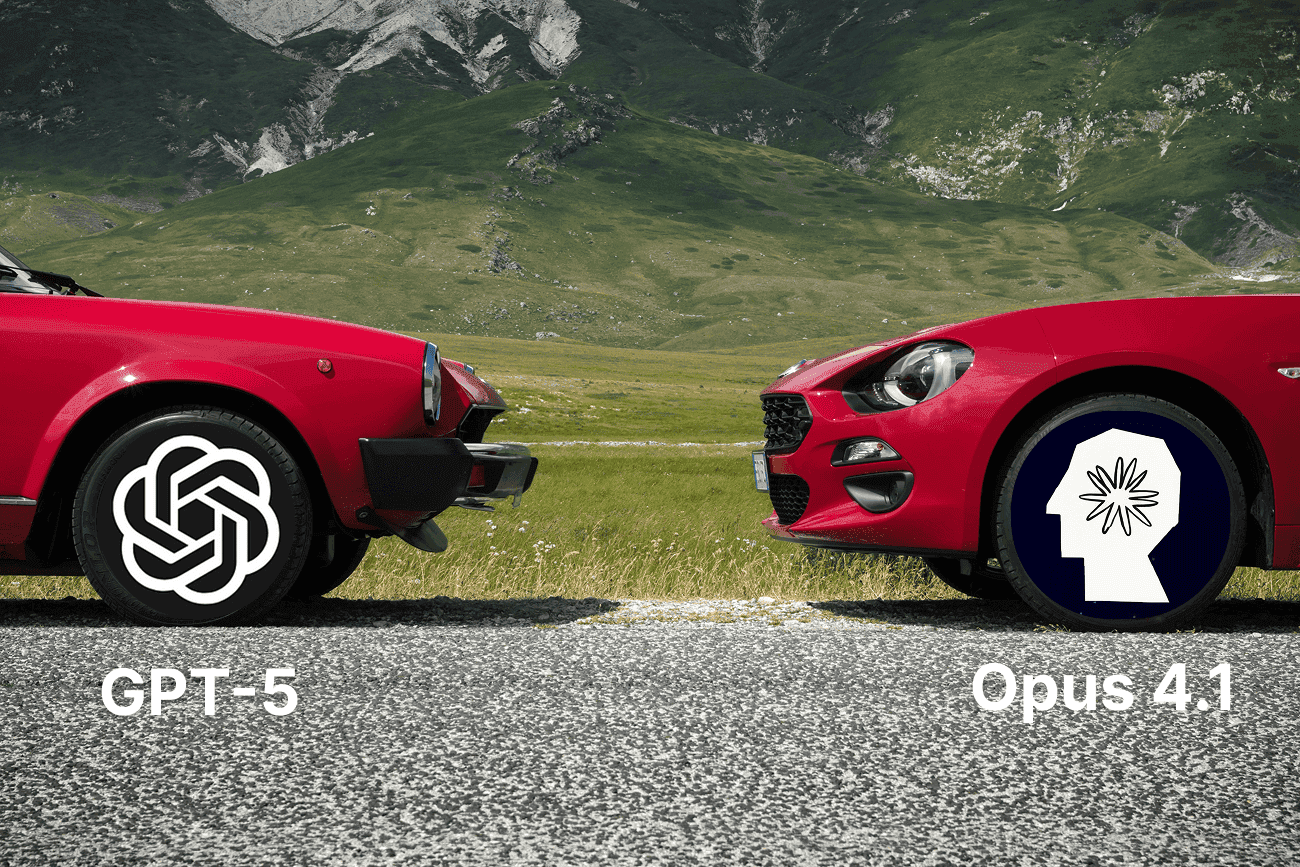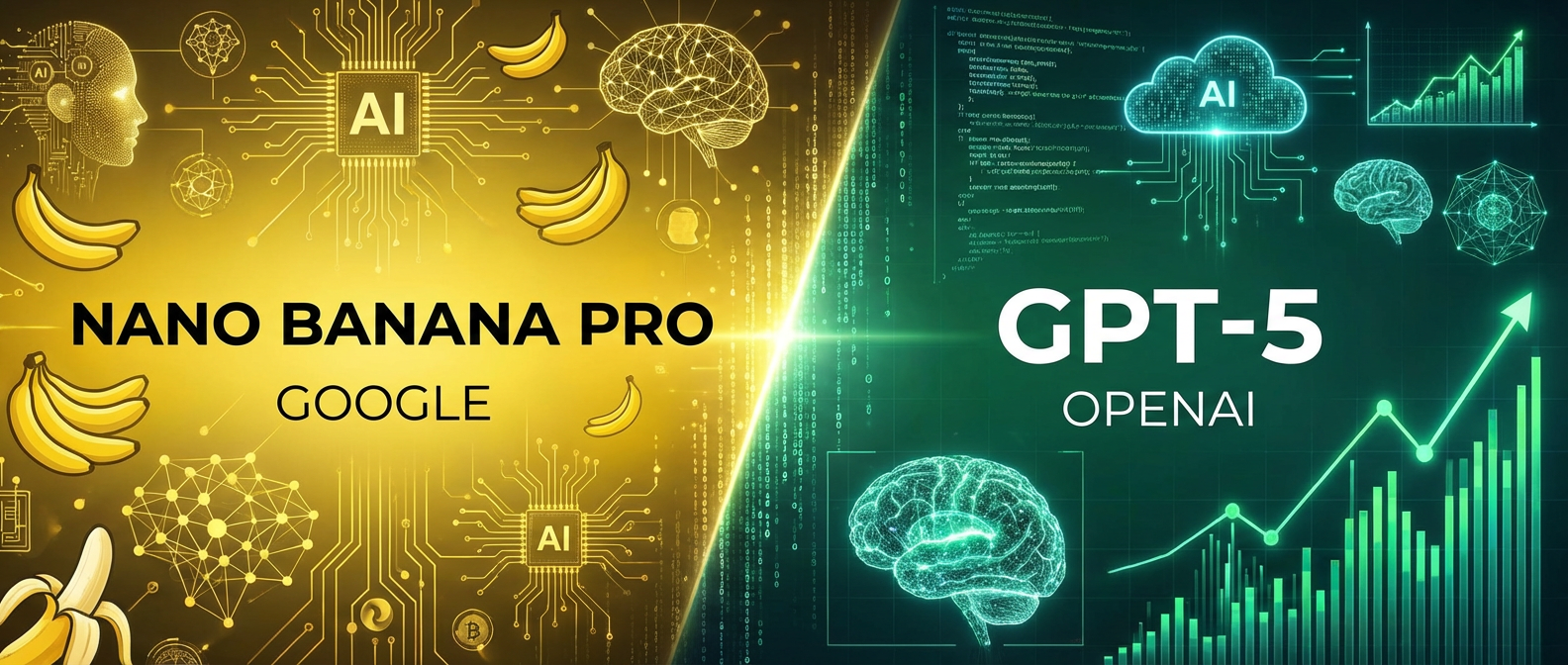Recently the AI world experienced two massive releases. Two major players dropped the biggest model release of the year: OpenAI's GPT-5 and Anthropic’s Claude Opus 4.1. Both models aim to take reasoning, coding, and autonomous tasks to the next level but each model comes with its own set of wins, warnings, and controversies.
There are early reactions that show that both launches came with their own challenges.
Quick early review: let’s check it out
GPT-5 came with its “unified system” that has fast and deep reasoning but it faced the same backlash which includes colder and less human-like tone, model removals without prior warning, confusing usage caps, and safety concerns.
Claude Opus 4.1 on the other hand was praised for its precision and exceptional coding ability but it was pricey compared to other competitors and had occasional slower performances.
So which one actually delivers?
In this article, we’ll discuss:
Experts' and early adopters' opinions
Compare their specs and benchmarks
Break down how they perform practically
About the Author: I’m Artem Vysotsky, the founder of Writingmate.ai all-in-one platform that gives you access to over 200 AI models all in one place. I test every major release and share insights with businesses and builders. Connect with me on LinkedIn for real-time updates.
Timings and what was shipped
To understand the differences better, let’s take a look at when and how each was released.
Claude Opus 4.1:
Claude Opus 4.1 dropped on August 5. It is an incremental upgrade, an updated version of Opus 4. The model focuses mainly on coding and agentic workflows. Some users complain about high price and that sometimes it is operated slowly.
GPT-5:
Two days later, on August 7, OpenAI released GPT-5. It wasn’t just an upgrade – GPT-5 introduced a “unified system” that auto-switches between fast answers and deep reasoning. OpenAI also boasts of its measurable gains on its own evals but users complained about the cold personality, inconsistent usage caps, and sudden removal of models.
Spec Sheets at a Glance
Let’s compare the technical specifications.
Anthropic’s Claude Opus 4.1 is an incremental upgrade, highly precise and accurate especially in areas like coding and agent workflows. The new model is available in Claude Chat, via Anthropic API, OpenRouter, and Google Vertex AI.
OpenAI’s GPT-5 presents a new approach when AI model is positioned as universal system. There is the GPT-5 Pro modification for extended reasoning. OpenAI also claimed it has lower hallucinations and stronger performances in areas like coding, maths, and multi-modal tasks. Plus, API costs are rather low.
GPT-5 vs Claude Opus 4.1 Tables
FEATURES | GPT-5 | CLAUDE OPUS 4.1 |
|---|---|---|
Context Window | Handles up to 400K tokens, giving it more room for big projects. | Handles up to 200K tokens – still plenty for big jobs but less than GPT-5 |
Output Cap | Up to 128K tokens | Up to 32K tokens |
API pricing | $1.25 (input) / $10 (output) – much cheaper than Opus 4.1 | It begins with a premium pricing at $15 (input) / $75 (output). |
Distribution | Widely available: ChatGPT (Free, Plus, Pro, Team, Enterprise) + API. | Offered via Claude (Pro, Max, Team, Enterprise plans), API, plus partners like Bedrock and Vertex AI. |
Both models, as well as their predecessors, are available in Writingmate.ai
Benchmarks & Performance (Plus Important Caveats)
Let’s be real guys, specs tell us only one part of the story. The true realities can be revealed by the benchmarks, because real-world performance – is what truly matter. Let's look at comparison in different tasks.
Coding (SWE Bench Verified): OpenAI reported a 74.7% for GPT-5 based on a 477-task internal subset while Anthropic reports 74.5% for Opus 4.1 based on the full 500-task set. Anthropic warned that these are not direct comparisons because there are differences in datasets and testing setups (which make a lot of sense).
Math and Science: OpenAI recorded 94.6% on AIME 2025 (no tools) and state-of-the-art results on GPGA when using GPT-5 Pro. Claude Opus 4.1 on the other hand showed incremental improvement over Opus 4 with AIME rising to 78.0%.
Quick take: if advanced math or reasoning is your priority, GPT-5 Pro seems to have advantage.
Agents & Tools: Anthropic highlights it has made progress in the TAU-bench test and improved how the model handles multi-file code. On the other hand, GPT-5 is tested for having fewer mistakes and being more successful in reasoning tasks.
Takeaways: Experts generally consider Claude Opus 4.1 as the upgraded code assistant and GPT-5 as a versatile platform for broad types of tasks.

Early Sentiment on GPT-5
GPT-5 wasn’t just another AI model release. It was, to some extent, a statement by OpenAI. However, the response from AI community was mixed. Excitement here, frustration there…
What experts and users loved:
Cheaper API: API costs were cut and became more affordable.
Unified system: This makes GPT-5 easier to choose over other models because it offers fast and deep thinking modes (well who wouldn’t love it).
Fewer hallucinations: Fewer hallucinations were noticed particularly in the “thinking” mode. Besides, the refusal responses are well explained, and they even suggest safe options.
What is frustrating:
Colder tone: Users perceived GPT-5 as “colder” compared to the GPT-4 model which led OpenAI to introduce GPT-4o as an opt-in option and they also promised to make better adjustments.
Old model removals: Users were upset because older models were suddenly removed without prior notice.
Usage confusion: The initial 200/wk cap on GPT-5 “thinking” mode upset users until OpenAI clarified that the limits were much higher (3000 calls/week).
Safety concerns: Wired tests showed that harmful bypasses are very possible which raised the question of how safe the system really is.
“OpenAI's GPT-5 has had a tumultuous public launch, frustrating users and prompting Chief Executive Officer Sam Altman to respond.” — The Wall Street Journal
“We’re making GPT-5 warmer and friendlier based on feedback that it felt too formal before.” — OpenAI on X
Early Sentiment on Claude Opus 4.1
Claude 4.1 was popularly called the precision tool but it also had some trade-offs.
What reviewers loved:
Cleaner refactor: It handles multi-file edits well, leaving fewer unintended code changes.
Benchmark gains: It reported 74.5% on SWE-Bench verified based on a full 500-task set.
Where critiques showed up:
High price: It costs about $15 to $75.
Latency and verbosity: It can be slower to respond sometimes and too wordy.
Incremental upgrade: Consider it more of an “upgrade” than a breakthrough.
How Do They Compare Practically (Developers’ Feedback)
Coding
GPT-5: Users think GPT-5 is fast and more effective for everyday tasks.
Claude 4.1: Is considered more thorough and test-rich.
Writing and tone
GPT-5 is way stronger than GPT-4o but it has a colder personality.
Claude 4.1 still maintains its “human-like” responses.
Reasoning
GPT-5 unified system makes it a versatile platform and a great option for everyday use.
Claude 4.1 excels in long-horizon controlled edits.
Safety concerns
GPT-5 has fewer hallucinations and it explains its reasons for a refusal.
Claude 4.1 leans on its ASL-3 safety posture.

The screenshot taken from LMarena leaderboard, where GPT-5 is on the top, keeping Opus 4.1 the second.
Buyer’s Guide (First week advice)
Trying to decide which model to use? Let’s go through the common scenarios.
You want speed and cost control? Try GPT-5
API cost is very cheap and early developers noted that there were fewer tokens per job for common coding tasks. You can use “AUTO” by default and switch to “Thinking” if you need to solve difficult problems.Do you want meticulous repo work? Try Claude Opus 4.1
If you’re the person who handles large and sensitive codebases where unintended edits are not acceptable then Claude Opus 4.1 is the best option for you but you have to budget wisely.Do you want creative/long-form writing? Both work well
GPT-5 clearly supersedes GPT-4o but if you prefer Claude’s human-like responses, Opus 4.1 remains a strong choice. OpenAI released that they are working on a warmer version of GPT-5.Are you interested in regulated/enterprise rollouts?
Test both to see what exactly works for you.
My advice would be for you to treat benchmark claims as directional only. The SWE-bench result varies by subset and scaffolding. You can always test both models on your own repos and evaluation data. Then you can decide what really works for you.
Notable Controversies and Course-correction (GPT-5)
No launch is perfect, GPT-5 early weeks sparked some controversy and OpenAI responded.
Personality backlash: Users called GPT-5 “less warm and engaging.” OpenAI responded by re-enabling GPT-4o as an opt-in option and they also promised a warmer tone update.
Usage limits confusion: Early users found out that there was a 200 calls/week cap on the “thinking mode.” OpenAI fixed this by increasing the limits to 3000 calls/week.
Safety test: Despite claiming to have completed the “safe completion,” harmful prompts are still possible.
The Bottom Line
GPT-5 & Claude Opus 4.1 show two different philosophies.
GPT-5: The AI for everyone
GPT-5 positions itself as the go-to AI for everyday life for most users and businesses. With its affordability, versatility, and unified routing, it reduces friction in everyday AI use. Although it has some challenges, all of those can be fixed. You can expect mass adoption of GPT-5 amongst casual users, developers, and businesses.
Claude Opus 4.1: Your Go-to precision specialist
Claude focused on trust and careful control. It is pricey and responds slowly occasionally but it is a worthy investment for enterprises, research teams, and engineers.
Market dynamics and Future outlook:
GPT-5 focuses on reducing cost and making it more accessible for everyone. Claude focuses on precision and reliability. Highly likely, GPT-5 will dominate in breadth, like the previous OpenAI models. But Opus 4.1 may find its narrower, but very loyal niche of users for whom the quality and reliability outweigh the cost.
Frequently Asked Questions
Sources
- OpenAI – Introducing GPT-5
- OpenAI – GPT-5 Pricing and Models
- Anthropic – Claude Opus 4.1 Announcement
- Anthropic – Claude Model and Pricing Page
- WSJ – OpenAI’s Rocky GPT-5 Rollout Shows Struggle to Remain Undisputed AI Leader
- The Verge – ChatGPT won’t remove old models without warning after GPT-5 backlash
- The Verge – GPT-5 failed the hype test
- WIRED – GPT-5 Safety Testing
- Platformer – GPT-5 Launch Fallout
- https://www.reddit.com/r/LocalLLaMA/
- https://news.ycombinator.com/item?id=41582291
Written by
Artem Vysotsky
Ex-Staff Engineer at Meta. Building the technical foundation to make AI accessible to everyone.
Reviewed by
Sergey Vysotsky
Ex-Chief Editor / PM at Mosaic. Passionate about making AI accessible and affordable for everyone.



